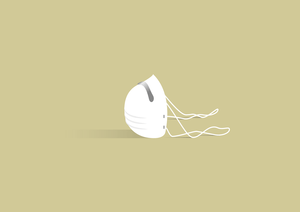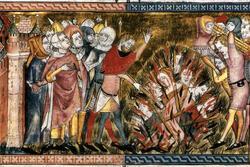Tackling Intergenerational Trauma during a Pandemic
Image by cromaconceptovisual from Pixabay.
On March 18, 2020, I came home from work and hurriedly crammed my possessions into a suitcase. In this one bag, I threw some work clothes, pajamas, toiletries, and an envelope of money I always kept in my drawer “just in case.” The number of cases of Coronavirus (COVID-19) had just spiked in Illinois, where I am a pediatrician at a Chicago free clinic. I was starting to get truly scared that I would infect my parents (both in their 60s), with whom I live. The emotions I felt while packing for an Airbnb I had booked hours before were visceral and primal. Why did I feel like I was fleeing? Why did I feel prepared to make this move as quickly as I had decided to go? Why was I sobbing as I packed, feeling like this was the end of life as I had known it?
Before this pandemic, my Jewish friends and I would joke about how we had been preparing for this exact kind of disaster scenario our whole lives. We often laughed about our moms’ seeming obsession with feeding us, illustrated perfectly by the Airbnb owner’s reaction to how much food my mom had packed me: “Save some for the rest of us!” But as the grandchildren of Holocaust survivors, we, in some ways, have been anticipating a disaster, readying ourselves to pick up and go at a moment’s notice.
Interestingly, research validates our anecdotal experience. Scholars of the Holocaust first began reporting on patterns of mental health changes in the children of Holocaust survivors in the 1970s. Not only did it appear that the survivors were suffering effects of trauma, but also that their children showed similar tendencies. This phenomenon has been labeled “intergenerational trauma.” Behaviors displayed by these individuals included anxiety, shame, food hoarding, emotional neediness, and low trust in community—in other words, survival mode. More recent research has explained this phenomenon further using a specific type of genetics called epigenetics, or the tiny changes in genes that can influence which genes are expressed. Scientists have shown that epigenetic changes, which can turn genes on and off, can lead to higher levels of cortisol, the stress hormone.
This could explain why the children or grandchildren of survivors have more mental health problems. In fact, data from soldiers who fought in the Yom Kippur War shows that the soldiers had a higher likelihood of developing PTSD if their parents were Holocaust survivors. Victims of other genocides have shown similar propensity to mental health problems and abnormal behaviors, as is seen in Native American communities and Rwandan genocide survivors and their children.
These changes and trauma responses would be considered adaptive in situations where people have to be alert to make sure their lives are not in danger. But you can see how this hypervigilance can hurt, rather than help, in normal, everyday life. However, not all data agree these changes are harmful. One way to explain this seeming disagreement is that it is possible that many of the inheritors of intergenerational trauma are more resilient—better at coping with new changes in their environment, unless exposed to extreme stress.
Perhaps that is what my friends and I have been experiencing during the COVID-19 pandemic. It does not take much scrolling through Twitter to see that many other young Jewish people on the Internet are grappling with similar emotions. Many people express anxiety, and some perfectly capture the dichotomy of intergenerational trauma: Hypervigilance means we are prepared, but should we have to be? This crisis validates our most deeply ingrained fears, our Jewish over-preparedness, but what about the moments when the threat isn’t real and our trauma isn’t useful? User @ecosexuality tweets “Being a neurotic Jewish hypochondriac with hyper-vigilance and generational trauma embedded in my DNA is both helping and hurting me right now TBH.”
What we are learning is that these dysfunctional responses to trauma can be controlled and overcome. Communities whose members participate in therapy are seeing positive results in terms of mental health improvements and addiction prevention. Currently, while isolating, it feels especially relevant to discuss and acknowledge how our inherited trauma affects us. Not only does this trauma explain our behaviors, our irrational thoughts, and some of our anxieties, but it suggests that our people may need a little extra help in these trying times. This self reflection is useful because it means we should go easy on ourselves even if we are feeling sad, scared, and fatigued. It also points to the need for our community to come together now more than ever to support each other, even if remotely.
My initial reaction to evacuating because of the pandemic was not histrionic. My ancestors' legacy of survival armed me with the tools necessary to overcome these situations, as well as to anticipate that they will likely occur and reoccur. Even though our initial reactions, as Jews, may be to trivialize and mock our fears, it is also worth remembering that our responses to stress are quite literally programmed into our DNA. Validating these experiences will serve us in the future when we unpack the extent to which this massive global pandemic actually changed us, and hopefully pave the way for recovery and rebuilding.







explains a lot. Thanks
An excellently written article by an amazing sister!
I agree with my ancestor legacy of survival, my mother was a Holocaust survivor in Hungary, and she was afraid of the next war or revolution coming again ,so her motto was, prepare the worst,don't let your guard down ever!e hoarded food, never throw anything out,and after all this years here in U.S.A.i live a same wayMy American husband make fun of me, but I just hardwired of survivor genes.and always prepared for a worst...
Have you been living in an Airbnb this whole time?
Thank you Dr. Ehrenpreis for validating and acknowledging what many Jews are feeling in this sensitive and overwhelming time. Agreed, we should appreciate how are DNA has prepared us and helps guide our coping in this New World.
This is a beautifully written description if what so many of us have been experiencing. Thank you for giving voice to these feelings and for your work with children.
This is a well done research piece that shows how anecdotes and evidence can go hand in hand in explaining and understanding psychological behavior on the part of Shoah survivors and their kin, including myself. I am the child of survivors.